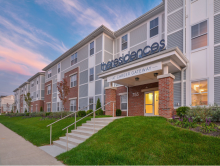0
Interactive
Community:
The Legal Bibliography is collection of 100+ papers, toolkits and other materials focused on privacy, consent and policy documentation. Co-developed by the Network for Public Health Law and Data Across Sectors for Health (DASH), the Bibliography is a growing resource for lawyers and community data practitioners, intended to support local collaboratives in their efforts to share data across sectors.
Authored by: Data Across Sectors for Health (DASH) and Network for Public Health Law (NPHL)
Topics: Criminal justice, Data sharing, Education, Health, Homelessness, Housing, Mental health, Partnerships, Safety
 Shared by Housing Is
Shared by Housing Is
Housing Is posted a
on Apr 8, 2019
Data Across Sectors for Health (DASH) and Network for Public Health Law (NPHL)
The Legal Bibliography is collection of 100+ papers, toolkits and other materials focused on privacy, consent and policy documentation.
0
Interactive
Community:
Nov 14, 2018
After decades of sprawl and suburban dominance, U.S. cities are experiencing rebounding populations, growing employment, and new public and private sector investments in places that are walkable, transit-oriented, and support diverse people and amenities. But we know that the benefits of these trends are not equally distributed, presenting an urgent opportunity for local and regional leaders to advance place-led development that produces better economic outcomes for more people in more places.
To help deliver on that imperative, the Metropolitan Policy Program at Brookings launched the Anne T. and Robert M. Bass Center for Transformative Placemaking (“Bass Center”) with an event on Wednesday, November 14. In collaboration with Project for Public Spaces (PPS) and the National Main Street Center (NMSC), the Bass Center will inspire public, private, and civic sector leaders to make transformative place investments that generate widespread social and economic benefits. Brookings President John Allen, Bass Center Director and Senior Fellow Jennifer Vey, special guest speaker Carol Coletta, and a distinguished panel of experts discussed how market and demographic trends are driving new demands for placemaking that benefit more people and places.
Authored by: The Brookings Institution
Topics: Community development, Housing, Partnerships, Place-based, Safety, Stability
 Shared by Mica O'Brien
Shared by Mica O'Brien
Mica O'Brien posted a
on Nov 19, 2018
The Brookings Institution
After decades of sprawl and suburban dominance, U.S. cities are experiencing rebounding populations, growing employment, and new public and private sector investments in places that are walkable, transit-oriented, and support diverse people and amenities.
0
News Article
Community:
Oct 23, 2018
In January, mothers with substance-abuse disorders will have a long-term resource to help break the cycle of their addiction. That’s when Tucson Medical Center and CODAC Health, Recovery and Wellness, in partnership with the Connie Hillman Family Foundation, open their new transitional housing program in midtown Tucson for mothers who are battling drug or alcohol addiction.
Authored by: Mikayla Mace for Arizona Daily Star
Topics: Homelessness, Housing, Low-income, Partnerships, Safety, Stability, Substance abuse
 Shared by Mica O'Brien
Shared by Mica O'Brien
Mica O'Brien posted a
on Oct 25, 2018
Mikayla Mace for Arizona Daily Star
In January, mothers with substance-abuse disorders will have a long-term resource to help break the cycle of their addiction.
0
News Article
Community:
Oct 24, 2018
Around the country, there is a growing understanding that survivors of domestic violence often need more than emergency shelter to become safe from violence and establish stable homes. Communities are employing innovative strategies and practices that help address survivors’ unique situations, such as flexible funding and domestic violence rapid re-housing. This momentum is matched by increasing resources from federal, state, and local funders interested in supporting safe housing solutions. But until stakeholders recognize the extent of the need for safe housing, many survivors will continue facing barriers to housing and options for safety.
Authored by: Pef Hacskaylo for How Housing Matters
Topics: Domestic violence, Homelessness, Housing, Legislation & Policy, Partnerships, Safety
 Shared by Mica O'Brien
Shared by Mica O'Brien
Mica O'Brien posted a
on Oct 25, 2018
Pef Hacskaylo for How Housing Matters
Around the country, there is a growing understanding that survivors of domestic violence often need more than emergency shelter to become safe from violence and establish stable homes.
1
News Article
Community:
Aug 19, 2018
A body of evidence points to a link between living in areas of concentrated poverty and health.
Authored by: Paul Chisholm for NPR
Topics: Child welfare, Community development, Health, Housing, Low-income, Medicaid / Medicare, Metrics, Partnerships, Racial inequalities, Safety
 Shared by Housing Is
Shared by Housing Is
Housing Is posted a
on Aug 20, 2018
A body of evidence points to a link between living in areas of concentrated poverty and health.
 Shared by Housing Is
on Apr 8, 2019
Shared by Housing Is
on Apr 8, 2019



 Shared by Housing Is
on Aug 20, 2018
Shared by Housing Is
on Aug 20, 2018




